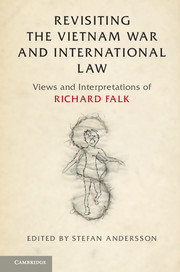Book contents
- Frontmatter
- Dedication
- Contents
- Foreword: The Harmful Legacy of Lawlessness in Vietnam
- Preface
- Acknowledgments
- PART I THE US ROLE IN VIETNAM AND INTERNATIONAL LAW
- 1 A Vietnam Settlement: The View from Hanoi
- 2 US in Vietnam: Rationale and Law
- 3 International Law and the United States Role in the Viet Nam War
- 4 International Law and the United States Role in Viet Nam: A Response to Professor Moore
- 5 The Six Legal Dimensions of the Vietnam War
- PART II WAR AND WAR CRIMES
- PART III THE VIETNAM WAR AND THE NUREMBERG PRINCIPLES
- PART IV THE LEGACY OF THE VIETNAM WAR
- Index
2 - US in Vietnam: Rationale and Law
from PART I - THE US ROLE IN VIETNAM AND INTERNATIONAL LAW
Published online by Cambridge University Press: 28 December 2017
- Frontmatter
- Dedication
- Contents
- Foreword: The Harmful Legacy of Lawlessness in Vietnam
- Preface
- Acknowledgments
- PART I THE US ROLE IN VIETNAM AND INTERNATIONAL LAW
- 1 A Vietnam Settlement: The View from Hanoi
- 2 US in Vietnam: Rationale and Law
- 3 International Law and the United States Role in the Viet Nam War
- 4 International Law and the United States Role in Viet Nam: A Response to Professor Moore
- 5 The Six Legal Dimensions of the Vietnam War
- PART II WAR AND WAR CRIMES
- PART III THE VIETNAM WAR AND THE NUREMBERG PRINCIPLES
- PART IV THE LEGACY OF THE VIETNAM WAR
- Index
Summary
A peaceful settlement of the Vietnam War requires some initial conception of a reasonable bargaining position for both sides. In my judgment, the United States has not sufficiently shown that it understands or is prepared to negotiate on such a basis.
Our continuing refusal to recognize the Vietcong as a formal participant in a peace settlement underscores our unreasonableness. It implies that the Saigon regime is the only legitimate political elite in South Vietnam, whereas the claims of the NLF to both autonomy and legitimacy are at least as good as, and probably considerably better than, those of Saigon. To say that Hanoi alone represents “the other side” is to insist upon the fiction that there is no genuine civil war in South Vietnam and that the war has from beginning to end been a consequence of aggression by North Vietnam. Such a premise for negotiations is obviously unacceptable to the NLF, but even Hanoi – however much it might like to control the future of South Vietnam – is naturally reluctant to concede this American interpretation of the war. Neither the actual political relationships nor the stated objectives of Hanoi bear out the American contention. As a preliminary adaptation to political reality, it is important for the United States to acknowledge the war for what it primarily is – a civil war in which both sides have received extensive military support and political guidance from outside states.
This interpretation leads to the conclusion that in any settlement Saigon and the NLF must participate and negotiate on the basis of formal equality. And if the negotiations are to succeed, once formal equality is established, it will also be necessary to recognize the factual inequality of the two sides. That is, it will be necessary to recognize that the NLF commands more military power and political stability than Saigon.
Our policy in Vietnam is an outcome of the crusade against Communism and typifies the pitfalls of accepting an over-generalized commitment to fight whenever and wherever there may otherwise result an extension of Communist influence. This anti-Communist crusade has led to the use of military power by the United States throughout the world. It has also led the United States to repudiate increasingly the procedures of the UN that it did so much to create.
- Type
- Chapter
- Information
- Revisiting the Vietnam War and International LawViews and Interpretations of Richard Falk, pp. 20 - 29Publisher: Cambridge University PressPrint publication year: 2017

